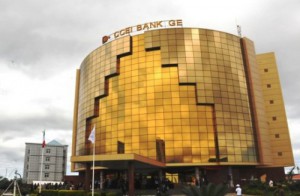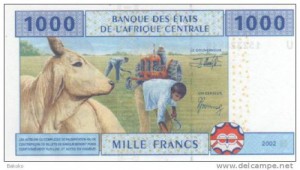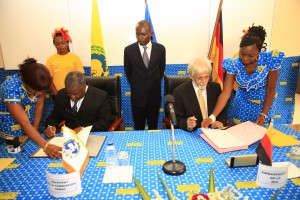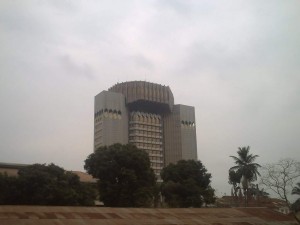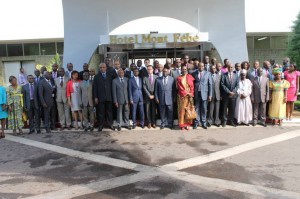
The common bank card to the six countries of the CEMAC will be launched on 29 January 2016 in Yaoundé
The Electronic Inter-banking Group of Central Africa (Gimac) will officially launch, on 29 January 2016 in Yaoundé, the Cameroonian capital, the “Gimac card”, which can be used to withdraw money and make payments through the electronic terminals of the six countries (Cameroon, Congo, Gabon, Chad, Equatorial Guinea and CAR) of the Economic and Monetary Community of Central African States (CEMAC in French).
The information was revealed by Cameroonian Valentin Mbozo’o, MD of Gimac, in an interview given to Quotidien de l’Economie. According to him, this community bank card is “a reality since the first quarter of 2015” and “there was an order for two hundred and fifty thousand (250,000) cards by end December 2015 from the banks that have already been certified”.
According to Mr. Mbozo’o, this new financial integration tool in the CEMAC area “is marketed by the National Financial Credit (NFC)”, a Cameroonian microfinance institution. “The Cameroon International Bank for Savings and Credit (BICEC in French), the Commercial Bank Chad (CBT), Ecobank Cameroon, already certified in 2015, are now at the inter-banking pre-production”, the MD of Gimac specified.
With “about 10 banks already operating on the platform” at the moment, “and another 10 or more projects of bank integration starting from January 2016, Gimac is targeting the integration of most of its members by end 2016, to finish setting up the inter-banking infrastructure of the electronic payments ecosystem of the sub-region”, Valentin Mbozo’o indicates.
BRM
Cameroon recruits three other banks like SVT for its bond issuance at BEAC
Since the beginning of 2016, there are now 16 banking institutions operating in the CEMAC zone working with the Cameroonian Public Treasury, to enable the government reach its targets in terms of fundraising on the public stock market of the Central African States Bank.
According to the communiqué announcing the first operation by the Cameroonian State in this market on 13 January 2016, Commercial Bank Centrafrique, Commercial Bank Tchad and CCEI Bank Guinée Equatoriale, have joined the 13 other banks approved as Treasury bond dealers (Spécialistes en valeur du Trésor -SVT in French) by the Cameroonian government, since the launch of the BEAC stock market at the end of 2011.
This increase in SVT is proof of the desire of the Cameroonian government to increase its fundraising capacities on this market which has become very popular with four other CEMAC countries (Gabon, Chad, CAR and Equatorial Guinea), except for Congo which remains the only State in the community to have not yet issued either bonds or Treasury bills on the BEAC stock market.
Main actor of the BEAC stock market since its launch in 2011, Cameroon is hoping to raise this year a total of FCfa 270 billion, against FCfa 195.5 billion for Gabon, and between FCfa 180 and 210 billion for Chad. Even the very fragile Central African Republic is looking to raise FCfa 8 billion on this market during the first half of 2016. Equatorial Guinea, for its part, has not yet revealed its intentions, after its first operation on this market in 2015.
BRM
Cameroun, Chad and Gabon will raise 670 billion FCFA on BEAC market in 2015
According to calendar forecasts for the three countries of the CEMAC zone which has been on the market since its creation, namely Cameroon, Gabon and Chad, 670 billion FCFA will be raised this year.
- Cameroon: securities issuance forecasts for a total amount of 375 billion FCFA, 55 billion FCFA of which will be used for fixed-rate interest payments on assimilatable Treasury bills.
- Chad: 160 billion FCFA, of which 130 billion FCFA are in ATBs and 30 billion FCFA in assimilatable Treasury bonds.
- Gabon: 135 billion FCFA on the BEAC market, of which 105 billion in assimilatable Treasury bills and 30 billion FCFA in assimilatable Treasury bond issuance.
CEMAC Wants Improved Seedlings
Countries of the Central African Economic and Monetary Community (CEMAC) are devising ways of acquiring high-yielding and disease-resistant seedlings to boost its agriculture.
A workshop to this effect held in Cameroon’s Economic Capital, Douala, on Tuesday November 5, 2013.
It sought ways of coming up with good policies within the sub-region in view of producing quality and quantity seedlings.
Also Read
14-09-2013 - Industrial Cassava Processing Underway in Sangmelima
Germany Donates 15 Billion to Combat AIDS in CEMAC
The Federal Republic of Germany has agreed to disburse 23 million Euros (about FCFA 15 billion) for the fight against HIV/AIDS within the Central African Economic and Monetary Community (CEMAC).
The German Ambassador to Cameroon, Dr. Klaus-Ludwig Keferstein and Jean Eudes Teya, Commissioner at CEMAC, who sat in for the CEMAC Commission President, signed the financial cooperation agreement to that effect at the head office of the Coordination Organisation for the Fight Against Endemics in Central Africa (OCEAC) on November 6, 2013.
The money will finance phase III of the Project to Prevent HIV-AIDS in Central Africa (PPSAC). The German government has already mobilised 10 million Euros (about 6.5 billion), through the German Development Bank (KfW), to kick-start the project. It consists among others in making available quality and quantity preservatives, both male and female, to halt the spread of the pandemic.
Cameroon Tribune quotes the German diplomat as say, “We are out to make easier universal access to both male and female condoms, zero infections and zero stigmatisation of the affected and infected population.”
Phase III runs from 2013 – 2016 and necessitates the recruitment of a consulting firm, acquisition of preservatives and other equipment as well as the development of adequate measures to reach the target of the project.
Supplementary funds (about FCFA 2.6 billion) will come from the sale of the preservatives. Negotiations are ongoing to bring Gabon and Equatorial Guinea into the project.
For the first phase of the project which ran from 2006 – 2008, the German government disbursed 10 million Euros (about 6.5 billion) and chipped in 25 million Euros (about FCFA 15 billion) for the second phase which ran from 2009 – 2012. Statistics show an average prevalence rate of the killer in the sub-region at 5.2 per cent with 5.5 per cent in Cameroon, 6.2 per cent in Central African Republic, 3.2 per cent in Congo, 5.9 per cent in Gabon, 7.2 per cent in Equatorial Guinea and 3.3 per cent in Chad.
Also Read
28-10-2013 - 50 Billion to Boost Maize, Cassava, Sorghum Production
Growth Rate Slumps in CEMAC Zone
The Monetary Policy Committee of the Bank of Central African States (BEAC) has disclosed that the growth rate in the CEMAC zone has dropped to 2.6 percent. The committee in March 2013 projected a 4.1 per cent growth rate.
Meeting in its third ordinary session in Yaounde on Thursday October 31, 2013, the Committee, headed by the Governor of BEAC, Lucas Abaga Nchama, noted that the slump is as a result of a drop in public investment, slow down in public works activities as well as a drop in oil production in the Central African Economic and Monetary Committee, CEMAC.
It also emerged from the session that inflation at the end of 2013 is expected to remain at 2.5 per cent, the monetary and public account situation will improve and there will be a slight drop in current external account.
To turn the tides, Mr Abaga Nchama said BEAC is doing everything to enhance the financing of the economy through the issuance of treasury bills by CEMAC member countries.
Also Read
BEAC Sharpens Money Laundering Combat Skills
- The Bank of Central African States (BEAC) has advocated the effective application of laid down texts on the prevention and fight against money laundering and the financing of terrorism in the sub-region by member countries of the Central African Economic and Monetary Committee (CEMAC).
The Governor of BEAC, Lucas Abaga Nchama, made the appeal recently at the end of a four-day capacity building and information sharing workshop in Yaounde on the stakes and challenges of the destroyer in the sub-region.
One of the recommendations of the workshop was effective collaboration and concertation between member countries and competent authorities in the fight against the economic ill both at national, sub-regional and international levels.
Mr Abaga Nchama is quoted by Cameroon Tribune to have said during the closing ceremony that surveillance control will be stepped up and detection computer software procured. The Action Group against Money Laundering in Central Africa, (GABAC), whose role is to lead, coordinate and boost actions undertaken by CEMAC member States as part of the fight against money laundering and terrorist financing and the various national agencies for financial investigations would need to redouble their efforts for efficiency.
Also Read
19-01-2011 - BEAC is favorable to a fiscal correction in Central Africa
Mags frontpage
- Most read 7 days
- shared 1 month
- read 1 month



